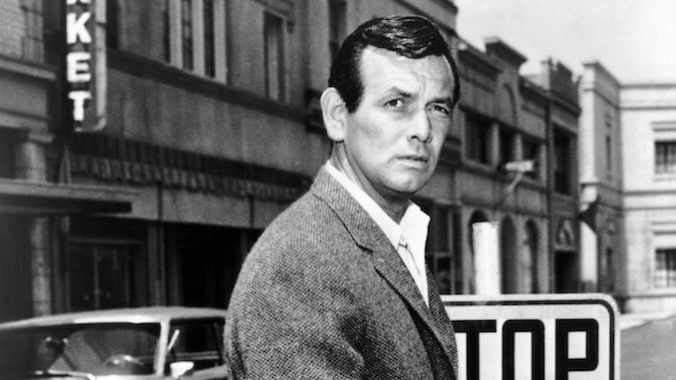That’s All, Folks: After 4 Seasons of Escapes and Fistfights, The Fugitive Finally Stopped Running
Photo Courtesy of ABC
Most scripted television shows end in cancellation, so there’s something special about the ones that get the chance to go out on their own terms. This year, Ken Lowe is revisiting some of the most influential TV shows that made it to an officially planned final episode. That’s All, Folks is a look back at television’s most unforgettable series finales.
![]()
It’s interesting to think of what a show like The Fugitive would look like today, 60 years after the original debuted. Peacock’s Poker Face is reasonably close (a desperate fugitive fleeing from a dogged and humorless pursuer, encountering adventures at every bump in the road), but it’s nowhere near the same tone. Pitching the show these days, I imagine a showrunner trying to cast a sharp and charismatic leading man playing a hypercompetent doctor,as the writers room engineers a slow-burn multi-season plot with twists and turns and conspiracies.
It would probably feature overarching plots and recurring characters, lots of reveals of things that were planned from the earliest days of the series: You could probably feel the actors’ choices in every scene.
The Fugitive was not really that kind of show.
The Show
David Janssen’s Dr. Richard Kimble is the show’s protagonist, but it really can’t be said that he’s a hero. It’s hard to compare him to any other main character in any other kind of drama or action show like this, which features chases and gunfights and punching and so, so much smoking. Janssen plays him as a quiet man, eyes perpetually downcast, voice a resigned rasp. He’s always wearing jackets and coats that seem like they’re engulfing him. He is a man in fear and desperation, hunted by the authorities, whose weakness is nothing more complicated than getting spotted by any random beat cop.
You probably know the story (since you probably saw the 1993 movie with Harrison Ford and Tommy Lee Jones). Kimble has been wrongfully convicted of the murder of his wife, but escapes during a train derailment. He knows he’s innocent, and believes that a one-armed man he saw leaving his home could be his wife’s true killer. He’s pursued by the relentless Lieutenant Gerard (Barry Morse, playing a thoughtful, no-nonsense, motivated lawman who also happens to be a total prick most of the time). The stakes are more than just Kimble’s reputation: If caught, his sentence is to pay the ultimate price.
Through it all, Kimble is not brave, not dynamic, not an AmeriCAN, but an AmeriCAN’T. There are episodes where Kimble has next to no personal agency: In “Middle of a Heat Wave,” an episode in the show’s third season, he becomes falsely accused of a girlfriend’s sexual assault after breaking up with her (due to the whole being-a-drifter-fugitive-from-justice thing). He’s up against a ticking clock: The local sheriff will discover that he’s a fugitive at any moment, and his girlfriend’s overprotective and vindictive sister is determined to hang the crime on him. The real criminal is the sister’s husband, but Kimble has absolutely nothing to do with finding this out. He spends the episode hiding, running, sweating through several layers of mid-century suit, and finally escaping the law once the other players in the story take pity on his plight. The episode’s epilogue, in which the character’s all resolve their simmering conflict with one another, doesn’t even include Kimble in the room. He was entirely incidental to, and a victim of, their lying, manipulating family drama.
This is, amazingly, not a bug of the show but an apparent feature of it. The Fugitive was one of the most popular shows on TV in its first season, and there’s been a lot of brow-furrowing over just exactly why. Kimble is anti-heroic in the sense that he isn’t a conventional hero, but what’s interesting is that it’s not in the easy, lazy way that a lot of characters are anti-heroes—Kimble isn’t out here torturing his enemies or discarding women. He’s anti-heroic in the sense that he seems powerless and overwhelmed, and you’re supposed to sympathize and identify with him more than you’re supposed to really want to be him. Something about that powerlessness spoke to audiences in the mid-1960s, when people were back from foreign wars and beginning to come to grips with a government that they knew was lying to them, a police force growing in power and brutality, and an industrialized United States full of the kind of people left behind in the kind of jobs Kimble toils in specifically because nobody cares about who tends their bar or mixes their cement.
-

-

-

-

-

-

-

-

-

-

-

-

-

-

-

-

-

-

-

-

-

-

-

-

-

-

-

-

-

-

-

-

-

-

-

-

-

-

-

-








































